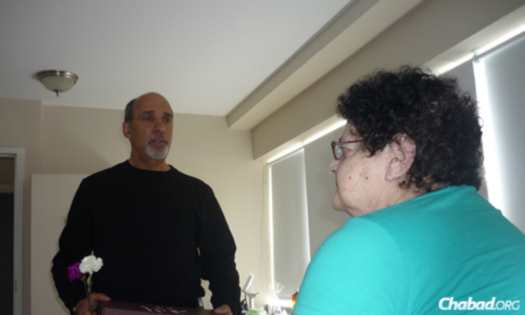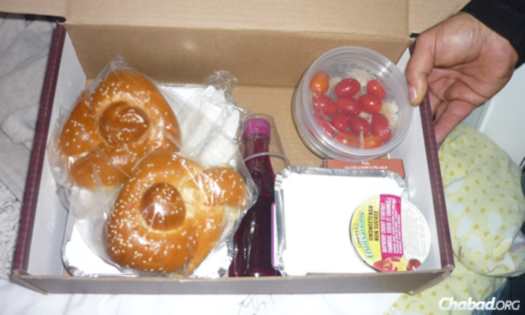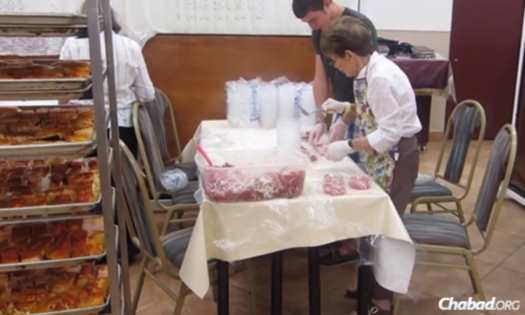
Food Deliveries Provide Nourishment in Many Forms
It’s Thursday afternoon, and Richard Ness, a 66-year-old Montreal textile executive married with two adult children, sits in his car, a silver European import. The backseat is piled high with bunches of fresh flowers atop a mound of burgundy boxes packed with food. He is on his way to bring Shabbat packages to a list of weekly recipients.
The elegant packages—marked “Shabbat to Share”—are among a total of 450 that are arranged and delivered by as many of 150 volunteers of the MADA Community Center, one of Chabad’s many centers in Montreal. Each box contains tea lights; two nickels to be placed in a charity box; a bottle of grape juice; two fresh challah rolls; a serving of fish; two salads; a container with a main entree of protein-providing meat, vegetables and a carb; dessert; and a specially prepared publication with stories, inspirational Torah thoughts, and the relevant prayers to be recited before and after the Shabbat meal.
After collecting his weekly load at the MADA Center, where volunteer “runners” bring the food packages right to his car, Richard picks me up on the way to his first stop. Bunni Bell currently lives in an assisted-living facility towering over the Decarie Expressway. On our way over, Richard explains that Bunni (whose given name is Golda) has moved around from one place to another, even staying briefly in a shelter. Wherever she has gone, he has followed her—bearing food, flowers and a smile.
As we pull up outside the facility, which is sandwiched between a car-rental establishment and a kosher burger joint, we pause to take a few pictures.
On the elevator ride up, Richard tells me that he encourages her to believe in her abilities and do more for herself. He says he often gets things for her and for his other regulars—small items like muffins or prescriptions—but mostly, he just brings companionship.
He tells me about his relationship to MADA, which he first contacted in response to a radio ad asking for volunteers. “I’m not a religious person—more what you would call a reform Jew—but here I am delivering Shabbat meals to people.”
Richard expresses his admiration for the organization’s food pantry, which he recently saw for the first time. “It’s just huge,” he enthuses. He says he often volunteers in the kitchen for one of their mega seders. He likes to think of himself as someone they can call on if another person cancels or they need an extra pair of hands.
The “Shabbat to Share” program—which began in the spring of 2011—is a weeklong effort. On Monday, the food is ordered. On Tuesday, the first group of volunteers come to cook in the MADA kitchen. On Wednesday, the food is packaged. On Thursday morning, the packages are assembled into the boxes, ready to be delivered to homes all over the Montreal Island that afternoon.
‘Made the Day More Special’
As we walk into the room, Bunni is sitting on her bed cross-legged, squinting at us through thick, plastic-rimmed glasses. She had an eye amputated a week ago, and has been having a hard time adjusting to her new look and limited vision.
After exchanging greetings and graciously receiving Richard’s compliments on how well she is recovering, she begins to complain about her bed, which she says is not comfortable. The two discuss various solutions, ranging from purchasing a new mattress to picking up the foam padding she used at her previous facility.
I ask Bunni if I may take pictures. She allows me to do so provided that I don’t show her face—“not until I get my new eye painted,” she says.
The two open up the food box together. Richard puts the perishable items into the mini-fridge (except for the rolls, which Bunni insists will be ruined if refrigerated). Before placing the grape juice inside, he breaks the bottle’s seal so Bunni won’t have to struggle with it later.
As Richard settles into the seat near her bed, he begins to twist the stems of the flowers. A moment later, I catch on. There’s a stumpy vase in the corner of the room. He takes the truncated bouquet and vase to the bathroom, and emerges with a neat floral arrangement, which he places on the windowsill.
The two banter about life in the facility and try to guess how long she will remain there. “You’ve got the corner suite with lots of sunlight. Do you think I can have a bed put in here and move in with you?” he jokes.
Richard ventures out to find a nurse. It’s my turn to pose some questions.
I ask her if the food packages have made her more aware of Shabbat. She confesses that she often eats them before the onset of the day. “Since my parents passed away,” she confides, “I don’t celebrate the holidays much. I’m alone with my memories. I use the time to relive the wonderful experiences I’ve had with my family. But in a way, they have made the day more special.”
In response to how the visits and packages have affected her, Bunni’s good eye mists over. “They touch me very deeply. Richard means the world to me—more than I can put into words.” I notice that Richard has come back from the nursing station, and seems pleased and touched to know that Bunni—for all her complaining—appreciates what he does for her.
After I snap a few last shots, we’re back in the hallway. Richard tells me about the stops he will make next.
“There is an old lady, the sweetest person you will ever meet,” he says, “who is bedridden. Besides from a visiting government nurse, I think I am the only person she ever sees.” Another regular is a single father with three small boys, each one with a different set of disabilities.
Compared with other deliveries, Richard takes relatively few packages with him since he travels to a neighborhood where the recipients are spread out. Some people, he notes, go to apartment buildings wheeling shopping carts door to door, loaded with Shabbat boxes and flowers.
“The people I deliver to are lonely and somewhat neglected,” he tells me on the drive back. “It’s a win-win. I feel good, and I know they feel better for me having stopped by.”



















YK
The amount of chessed this organization does is extraodinary. There are 500 families who rely on its support to survive. And many more who rely on their other services.
Chana
Beautiful mada reaches out yo EVERYONE in Montreal
GO MADA!
I filled in during New Years & did some deliveries. The pple poshut wait for their bell to ring! The smile they give you warms your heart!
A Montrealer
Beautiful!
So proud to be Lubavitch! Keep up your great work! Moshiach now!
MADA
Montreal is lucky to have such an amazing organization. So much work goes into doing the chesed that they do. Proud montrealer.